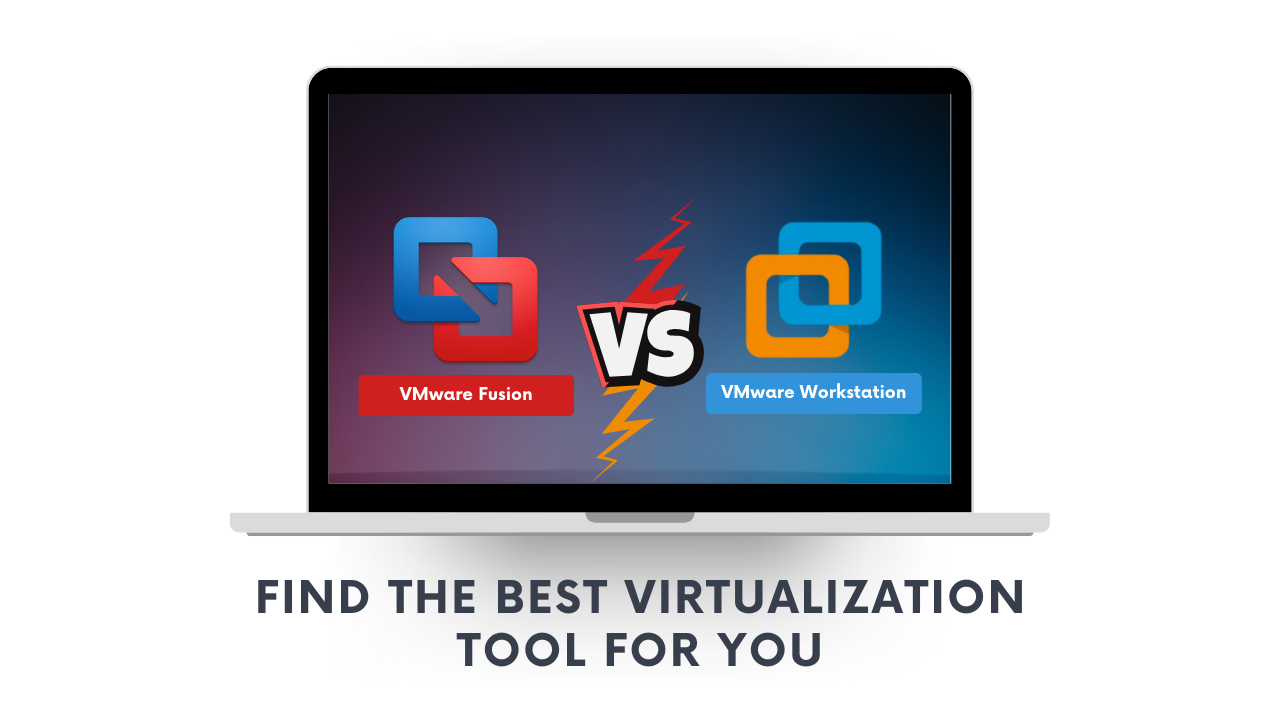VMware Fusion vs Workstation: Which VM Software to Choose

Confused between VMware Fusion and Workstation? Which software is perfect for you? Both are powerful virtualization tools, but they serve different users. VMware Workstation is designed for Windows and Linux, while VMware Fusion is tailored for macOS. Both applications provide efficient virtualization and allow you to run multiple operating systems concurrently on a single machine. In this guide, we’ll compare VMware Fusion vs Workstation in detail to help you choose the right VM software for your needs.
What is VMware Fusion vs Workstation?
VMware Fusion and Workstation are effective solutions for running virtual machines on computers and providing virtualized environments. Learn more here:
VMware Fusion
VMware Fusion is designed for macOS users, and it allows you to run Linux, Windows, and other operating systems on your macOS. Mac users who want to get a different experience alongside macOS can use VMware Fusion to run different operating systems without rebooting.
VMware Workstation
VMware Workstation, originally built for Windows, also supports Linux. It allows professionals to run multiple guest operating systems simultaneously, perfect tool for developers, testers, and IT admins.
Difference Between VMware Fusion vs Workstation
There are significant differences between VMware Fusion vs Workstation. Have a look:
Licensing Plans – Free or Paid
VMware Fusion Player and Workstation Player are completely free for personal usage, while Fusion Pro and Workstation Pro require a commercial license for advanced functionalities.
Platform Compatibility
The key difference between VMware Fusion and VMware Workstation lies in their platform compatibility. If you need software to run multiple operating systems on macOS, VMware Fusion is the ideal choice. In contrast, VMware Workstation is specifically designed for Windows and Linux, making it suitable for operating multiple operating systems on those platforms.
Use Cases for Both Software
When Mac users run Windows or Linux applications on their device, VMware Fusion is intended solely for this. Alternatively, VMware Workstation is best for developers, IT testing environments that provide various guest operating systems.
Benefits of VMware Fusion
Flexible to Use: VMware Fusion provides advantages to run different operating systems, such as Windows or Linux on Mac devices. Mac users don’t have to purchase another device to operate Windows. Using VMware Fusion virtual desktop, users can run multiple operating systems and allow other users to access their VMs.
Cross-Platform Workflow: VMware Fusion allows users to copy and paste files between Windows, Mac, and other virtual machines simultaneously. Fusion allows simple file, document sharing on your isolated virtual machines.
Gaming: VMware Fusion enables the simple installation of Windows virtual machines or others on Mac devices. Therefore, download your favorite games on the Windows VM even if they are not available on your macOS.
Snapshots: In VMware Fusion, you can take snapshots that save a specific moment of your virtual machine. When you use new software that comes from unverified sources, take a snapshot of your current VM. If the new software fails, then you can recover your previous VM by clicking on the snapshot.
Benefits of VMware Workstation
Enterprise Grade Feature: The software is built for professionals and enterprise environments. It supports complex virtualization needs by delivering enterprise-grade features.
Share Access to Co-Worker: Using LAN, share your virtual machine access with a coworker. It allows sharing with a specific operating system.
VM Cloning: VMware Workstation makes cloning virtual machines simple and efficient. Users can quickly replicate VM configurations and allow continuous reuse.
vCenter or ESXi Connectivity: Users can connect VMware Workstation to a vCenter server or ESXi host. The vCenter server and ESXi host provide the same console and data center directly from their device.
What are the Disadvantages of VMware Fusion and Workstation
- Performance Overhead: Running multiple virtual machines increases the performance overhead than a single hardware platform.
- Resource Consumption: When VMware runs multiple virtual machines at a time, it consumes CPU, RAM, and system resources.
- Pricing Problem: Commercial use needs paid licenses, which are costlier for small to medium-scale enterprises.
- Setup Complexity: The Installation and configuration process is complex for beginners and requires expertise.
VMware Fusion vs Workstation: Which one is Better?
VMware Fusion and VMware Workstation are two of the most popular desktop virtualization tools, but they are built for different host operating systems. However, VMware Fusion is built for macOS users, allowing them to run Windows, Linux, and other operating systems alongside macOS. VMware Workstation is developed for Windows and Linux hosts, giving users the ability to run multiple virtual machines with advanced management features.
In short, the choice between Fusion and Workstation comes down to your host system: Mac users should choose VMware Fusion, while Windows and Linux users will benefit more from Workstation.
Final Words
We hope this overview of VMware Workstation vs Fusion provides a clear idea of both the software and which one is perfect for your needs. Choose VMware Workstation if you’re a Windows or Linux user requiring advanced VM management, cloning, and enterprise integrations. Alternatively, if you’re a Mac user who needs Windows or Linux apps, choose VMware Fusion. To learn more about this kind of software or the latest updates, bookmark Msckey.



